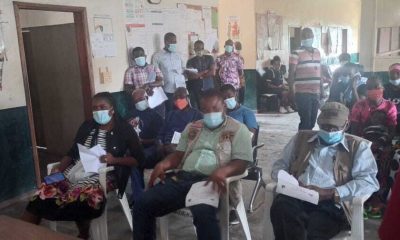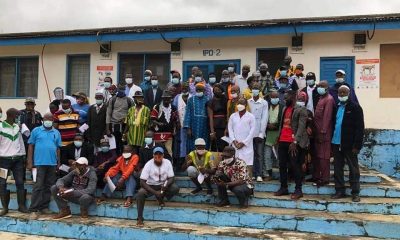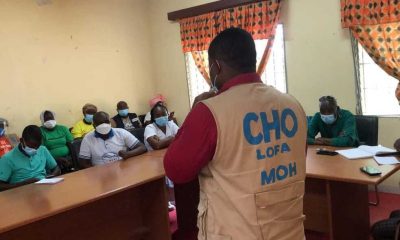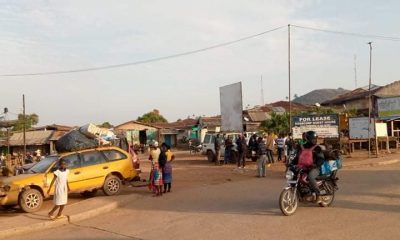Zorzor, Lofa County – Zoboi Zannah, a resident of Wakesu Town lost hs wife in child birth back in 2013, and he now has to care for the three children she left behind. The youngest of the three is seven years, and Zannah say it’s his burden to carry.
“I regret the death of my wife because for man alone to take care of children is not easy. Because of the living condition in this town I took two of the children we moved to Guinea during the Ebola time,” Zinnah said.
Maternal mortality remains one of Liberia’s main health concerns, as the country’s maternal mortality rate (MMR) remains one of the highest in the sub-region.
Before the Ebola outbreak, according to Liberia’s 2013’s Demographic Health Survey (LDHS) the country’s MMR was 1,072 per 100,000 live births. That was retrogression from a rate of 770 per 100,000 live births back in 2007.
Liberia is one of the 42 countries in the world with high maternal mortality, according to the World Health Organization (WHO).
Medical experts have named several factors responsible for the high MMR including lack of training, increase work load, shortage of midwives, bad roads in rural areas, lack of health logistics and limited knowledge of health policies.
But despite these huddles, some counties are making strides in slowing the high rate of deaths with the intent of avoiding the situation Zinnah and his three kids are enduring in Zorzor, Lofa County.
In Zorzor, the health team says it is recording a significant amount of decline in MMR so far this year. The district has 42 towns with 10 health facilities and two maternal waiting homes serving its health needs. The major hospital is operated by a faith based origination – the Lutheran Church in Liberia. The district’s population is over 4, 5900 people with children under one year constituting 4.0%, under five 17.0% and pregnant women 4.6%, according to a survey conducted by the district health team in February 2016.
Between 2010 and 2014, Zorzor experienced high MMR although the stats are unavailable.
“There were so many reasons that led to the high maternal death rate in the district,” said district health officer, Daniel Fayiah.
Fayiah said during that time, the district had one ambulance which pose constraints to health care delivery, and said there were other factors including the lack of trained midwives, maternal waiting homes and low supervisory.
“Supervising the workers requires more funding and the lack of supervisory role played major part in affecting the health care delivery system.” he said.
For now, Fayian said since mid 2015 there is some progress being made, while naming the existence of maternal waiting homes, increase in supervision, improvement in referring cases, training traditional midwives and availability of two ambulances as contributing factors.
There are also two medical doctors assigned at Curran Lutheran hospital in Zorzor city, while there are also six (BSN) nurses, six physician assistants, 23 registered nurses, nine registered midwives, and 29 certified midwives.
The number of health workers has improved services at various facilities across the district, Fayiah said.
The DHO said the two maternal waiting homes in Konia and Boukeza were constructed by locals in the areas with assistance from Concern Worldwide and International Rescue Committee (IRC). He said the district has setup a system to supervise traditional midwives.
“Year’s back the district health team never had any system put in place to really supervise traditional midwives in the district effectively due to low budget. Now with the (TTM) going through daily supervision it also helping to reduce maternal death,” he said.
“Since they built this maternal waiting home no pregnant woman has died as result of delivery, so I thank God,” said Kebbah Yassah Mulbah, a pregnant woman. “And [I] want to encourage all my friends that pregnant to go to hospital or the maternal waiting home soon when they are pregnant”.
Also commenting on the current statistic of maternal death at the Curran Lutheran hospital, Madam Yungor D. Mulbah, head midwife said: “Since January 2016 we have received three maternal death the latest one happened in July of this year with a women from our neighboring country Guinea, but the fault never came from us as a midwives, the delay came from them that led to her dead.”
Mulbah continued: “We don’t know how their health system looks like in their country; they brought the lady almost dead. We tried in our weak way she did not make it. This is why we always call on all the pregnant women to always go to clinic or hospital sooner when in that condition.”
Since the Ebola outbreak exposed the weakness of Liberia’s health system the ministry of health and partners are working to build a resilient health system.
The government has allotted over US$ 70 million in the 2016/2017 national budget for health. This means the health sector is third on the list of national priorities following Security and education.
Additionally, Government of Liberia and the United Nations Population Fund (UNFPA) on October 31, 2016 signed two separate agreements valued at 3.3 Million United States Dollars to support the strengthening of maternal and newborn health sector of Liberia.
The two projects support the Government of Liberia’s investment plan for building a resilient health system in 18 health facilities across 13 counties.
Report by: Franklin Flomo; Flomof2015@gmail.com/0777594766
Editor’s note: This story was also published by FrontPage Africa newspaper and online news.


Methodology

True
The claim is rigorous and the content is demonstrably true.

Half True
The statement is correct, although it needs clarification additional information or context.

Unproven
Evidence publicly available neither proves nor disproves the claim. More research is needed.

Misleading
The statement contains correct data, but ignores very important elements or is mixed with incorrect data giving a different, inaccurate or false impression.

False
The claim is inaccurate according to the best evidence publicly available at this time.

Retraction
Upon further investigation of the claim, a different conclusion was determined leading to the removal of the initial determination.

Toxic
A rude, disrespectful, or unreasonable comment that is somewhat likely to make you leave a discussion or give up on sharing your perspective. Based on algorithmic detection of issues around toxicity, obscenity, threats, insults, and hate speech;
































































































































































































































































































































































































































































































































































































